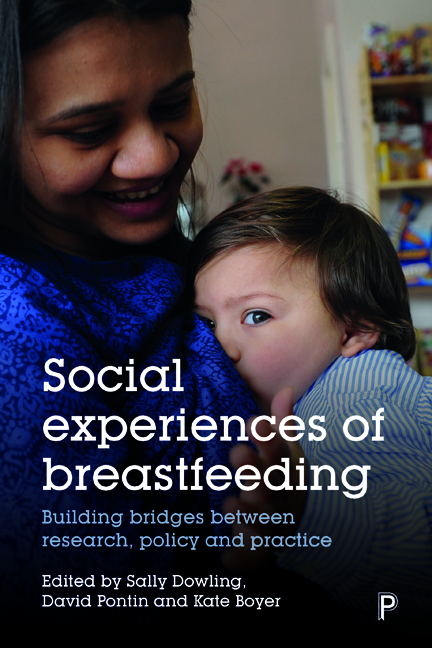Book contents
- Frontmatter
- Dedication
- Contents
- List of tables and figures
- Notes on contributors
- Acknowledgements
- Introduction
- The UK policy context: reconfiguration of the Unicef UK Baby Friendly Initiative to reflect the importance of relationships and ensuring sustainability
- Part I Breastfeeding and emotions
- Part II Cultures of breastfeeding
- Part III Breastfeeding and popular culture
- Conclusion
- Appendix: Schedule for ESRC Seminar Series: Social Experiences of Breastfeeding: Building bridges between research and policy, 2015–16
- Index
The UK policy context: reconfiguration of the Unicef UK Baby Friendly Initiative to reflect the importance of relationships and ensuring sustainability
Published online by Cambridge University Press: 22 April 2022
- Frontmatter
- Dedication
- Contents
- List of tables and figures
- Notes on contributors
- Acknowledgements
- Introduction
- The UK policy context: reconfiguration of the Unicef UK Baby Friendly Initiative to reflect the importance of relationships and ensuring sustainability
- Part I Breastfeeding and emotions
- Part II Cultures of breastfeeding
- Part III Breastfeeding and popular culture
- Conclusion
- Appendix: Schedule for ESRC Seminar Series: Social Experiences of Breastfeeding: Building bridges between research and policy, 2015–16
- Index
Summary
Introduction
Over the last 20 years, the Unicef UK Baby Friendly Initiative (BFI) has succeeded in gaining national recognition for the importance of breastfeeding and creating new ‘common knowledge’ related to many breastfeeding practices in the health service and among policy makers. For example, once hotly debated topics such as skin-to-skin contact, rooming in, teaching mothers how to breastfeed and avoiding supplements are now accepted as good practice. While not every mother in the UK receives this level of support, overall standards have improved and breastfeeding initiation rates have steadily increased: from 62% in 1990, to 76% in 2005, to 81% in 2010 (McAndrew et al, 2012), with 84% of all infants now born into a Baby Friendly accredited hospital (Unicef UK, 2017a).
Despite this progress, as well as the overwhelming evidence that breastfeeding saves lives, improves health and cuts costs, breastfeeding continuation rates in the UK remain some of the lowest in the world (Victora et al, 2016). Infant formula feeding is entrenched in society as the cultural norm (Unicef UK, 2016a); the physiological norm of breastfeeding, with the concurrent emotional attachment and relationship-building, has been interrupted. Having raised the foundation level of knowledge and skills within maternity care in the UK, in 2012 the Unicef UK BFI incorporated new evidence and developed additional Baby Friendly standards, including a focus on supporting parents to build close and loving relationships with their infants (Unicef UK, 2013). Building on the success of the BFI, the new standards aim to further improve the health and wellbeing outcomes for all infants and their mothers, irrespective of their feeding method.
Historical overview
In 1989, to reverse the alarming global trend towards increased use of breast milk substitutes and to raise the momentum of political pressure on infant formula companies to stop undermining breastfeeding, the World Health Organization (WHO) and Unicef published a joint statement: Protecting, promoting and supporting breastfeeding (WHO/Unicef, 1989). This statement included ‘Ten steps to successful breastfeeding’ (see Figure 1).
In 1991, WHO/Unicef launched the global Baby Friendly Hospital Initiative (BFHI). The purpose of this initiative was to support the development of an infrastructure in maternity care facilities that enabled them to implement the Ten Steps (WHO/Unicef, 1992).
- Type
- Chapter
- Information
- Social Experiences of BreastfeedingBuilding Bridges between Research, Policy and Practice, pp. 11 - 20Publisher: Bristol University PressPrint publication year: 2018



